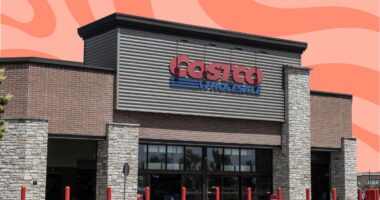When it comes to coffee, Starbucks, Dunkin’, and McDonald’s are probably the first big chains that come to mind. And while their coffee is top-tier (who could turn down a Starbucks salted caramel cream cold brew?), there are other coffee shops in the U.S. that serve up high-quality drinks. Cotton candy frappuccinos may not be on their menus, but these brands are serving up the best quality coffee on the scene.
But what does “high quality” mean when it comes to this ubiquitous beverage? According to the 2022 National Coffee Data Trends Specialty Coffee Report, 69% of specialty coffee drinkers were more likely to buy coffee that’s freshly roasted, and 68% cared that the level of roast was specified. And out of the top five reasons for being likely to buy from a coffee company, three of them were related to the origin of the beans: whether the farms they came from treated workers well, paid fair prices, and grew crops sustainability.
That’s why it’s important that coffee shops have a good relationship with the farms that they source from—so they know what practices go on and how to best capture the origin’s flavor in their roast. After all, unique flavor was the #1 way that customers judged “quality” coffee in a survey by Barista Magazine and Handground HQ.
So, which coffee chains are most in-the-know about where their coffee comes from and how to bring out that one-of-a-kind flavor in the roast? Read on to find out.
And don’t miss 6 New Menu Items Dunkin’ Is Launching Today.
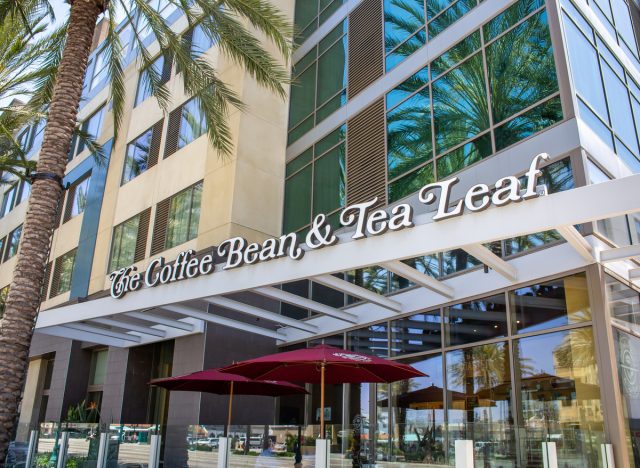

With over 1,000 stores worldwide, The Coffee Bean & Tea Leaf has been offering top-tier coffee since its founding in 1963. The Los Angeles-born business selects only the top 1% Arabica beans from best-growing regions in the Pacific, East Africa, and Latin America. It sources from high altitudes of up to 6,000 feet, which leads to highly concentrated flavors. “Quality has always been our No. 1 priority, and it will never be compromised,” the chain states on its website.
The brand is all about “respecting each individual roast,” and adjusts the roast degree to the characteristics of the bean’s origin. “We roast in small batches at our facility in Camarillo, Calif., where we find the roast that best suits the beans from each origin and captures what makes each country’s coffee unique,” states Coffee Bean & Tea Leaf on their website. The company knows where every bean comes from, and they proudly let customers know, too.
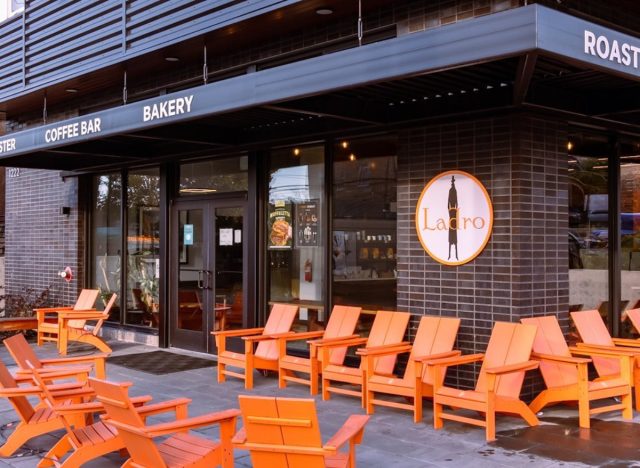

A Seattle coffee roaster with 18 cafés and nationwide shipping, Caffe Ladro has strong connections with the farms and co-ops where it sources its beans. Roasters often travel to meet with farmers and get a better sense of where the coffee comes from, so they can learn the best ways to roast it. Jack Kelly, CEO of Caffe Ladro, even brings the roasted coffee back to farmers to try. Because Caffe Ladro has such a close relationship with the farms, the chain is able to ensure sustainable farming practices and high wages for its workers.
As for unique flavors, the Seattle company tours the world participating as competition judges of the best coffee. One Caffe Ladro roaster visited Guatemala and purchased three bags of the top-ranked coffee from a recent competition. “Meeting the farmers we buy coffee from made roasting a more personal experience for me. I came back from Guatemala feeling more connected and aware of how what we do in the states impacts the farmers in countries that grow coffee,” said Ryan Rabaca, Head Roaster, on the Caffe Ladro website.
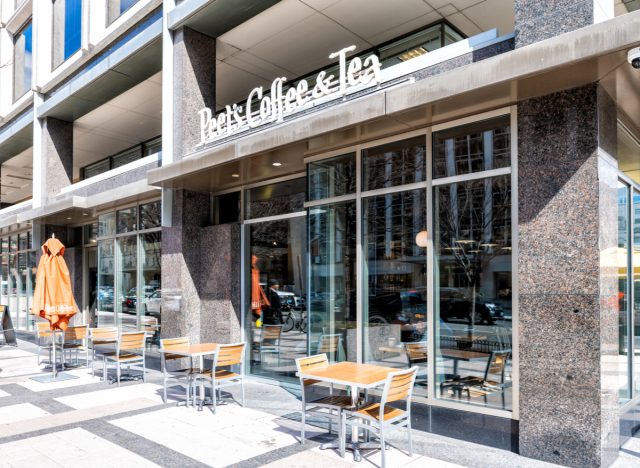

Operating over 300 shops across the country, Peet’s Coffee and Tea has grown to be quite a coffee giant since its founding in 1966. It all began when the founder, Alfred Peet, left his job in the coffee import business to start his own shop that promised to use only the highest quality beans. And that’s how Peet’s Coffee and Tea still operates today—by selectively sourcing the top 1% of coffee beans from the world’s best growing regions.
To source high-quality beans, Peet’s Coffee and Tea has developed strong connections with its farmers. Sourcing begins by getting to know the farm on all levels, including social and environmental. Not only does Peet’s have its own bean quality in mind, but they work with farms to develop community service programs and training and education opportunities for its workers.
The growing coffee chain also roasts by hand, meaning roasters don’t rely on machines to do the on-the-ground work. They smell, taste, and cup the beans themselves, and adjust their approaches through trial and error to make sure that they’re bringing out the flavors of the origin region. In fact, the coffee team tastes coffee samples three times before the beans even get to the roastery. And beans are not roasted until they’re ordered, guaranteeing fresh coffee each time.
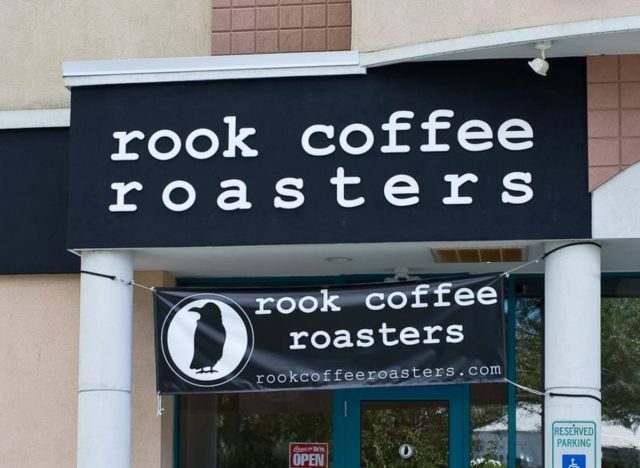

Headquartered in Long Branch, N.J. with 11 stores and counting, Rook Coffee has East Coasters talking—and for good reason. Not only is each cup of coffee made to order, but Rook is known for its extensive sourcing. The coffee chain visits farms all over the world to get to know farmers and their families. That way, they can see how things are done on the farms up close and can adjust the roasting process to match.
READ RELATED: Rihanna Shares How She Really Feels About Her Body During Pregnancy
According to The Finest Roast, Rook coffee is sourced from Costa Rica, Turkey, Bali, Columbia, Sumatra, Guatemala, and Ethiopia. The business takes the time to understand each coffee’s unique flavor, so the chain intentionally roasts in small batches with multiple quality checks along the way.
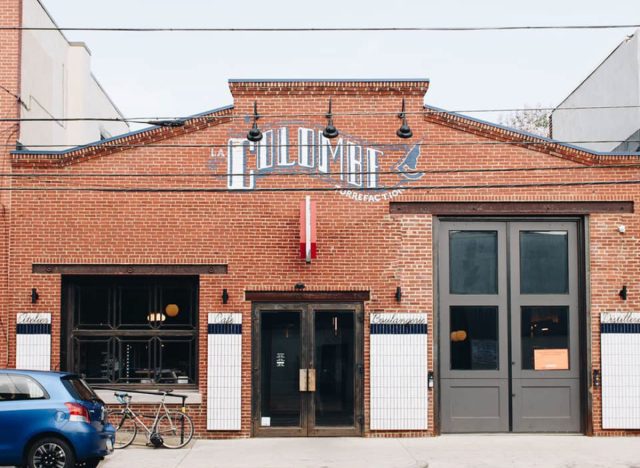

Best known for its strict sourcing practices, Colombe Coffee Roasters is the chain on the rise. With 32 locations across the U.S. and more coming soon, the company is quickly growing because of its quality. “We immerse ourselves in local growing dynamics so that we can identify specific projects that can improve the quality of lives in the region while establishing a new standard for coffee quality,” the chain says on its website. Connecting with the farms that grow the coffee is top-of-mind for this brand, so it can develop unique flavor profiles and better the farms and their communities.
Colombe Coffee Roasters offers both locally-roasted coffee, which captures the flavors of states and cities across the country, and single-origin roasted coffee, which brings out flavors from regions around the world. For example, on the local end, the chain collaborated with The New Yorker to create The New Yorker Blend, which embodies sunny New York City days spent outdoors. The coffee shop is all about making people happy, and it does it through high-quality, unique coffee.
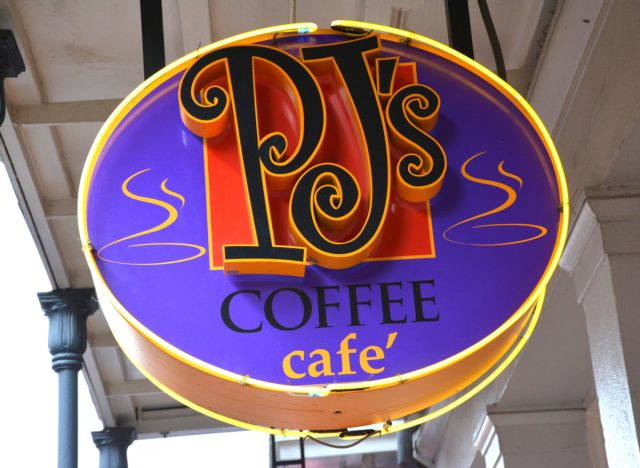

With 140 current locations and more than 200 in the works, PJ’s Coffee of New Orleans recognizes “the soul of coffee.” The company cares about crafting a high-quality experience for customers who appreciate what goes into making the perfect cup of coffee. To ensure top-quality, PJ’s uses only the top 1% Arabica beans from 14 different origins: Sumatra, Ethiopia, Colombia, etc. But just because it sources from many places doesn’t mean that this coffee company doesn’t get to know its farms. In fact, PJ’s works very closely with coffee farmers, calling it “a true farm to cup experience” on its website.
For example, the New Orleans-born chain adopted Finca Terrerito in Honduras, where they’ve created several programs to better the lives of farmers. Because of the time PJ’s has spent there, the company has gotten to know the Finca Terrerito flavor profile, which is “a bright, lightly fruity taste profiles with a very clean finish that doesn’t linger. Picked at ripeness and sun-dried on a cement platform, coffee cherries at Finca Terrerito are the apexes of coffee quality,” PJs describes on their website.
Roasting is all the better for the company’s close attention to farm-level practices. The coffee is roasted in small batches of 300 pounds or less to continually evaluate the quality and flavor profile. And fun fact: the chain’s iced coffee is a must-try because it’s made using a special cold-drop process that preserves the origin region’s flavor and makes coffee that is less acidic.
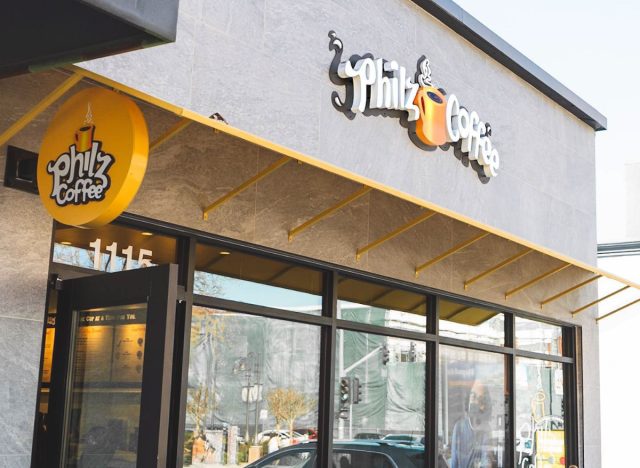

Philz Coffee, founded in San Francisco’s Mission District, now has over 60 locations. The mostly West Coast chain prides itself on quality bean sourcing. “Every cup begins with our commitment to sustainability and responsible sourcing,” states the Philz Coffee website. Not only does Philz Coffee visit farms, but the company also asks producers to fill out a questionnaire about their practices for every coffee lot purchased. These questionnaires allow the growing company to readily communicate with its origin regions so it can create the very best roast.
With quality practices and sustainability efforts in place, it’s no surprise that Philz Coffee has become a favorite among the tech industry crowd. According to Forbes, Philz sends wholesale coffee beans to Twitter and Salesforce, has stores right near Apple, and has even catered an event for Priscilla and Mark Zuckerberg. While you won’t find a flavor-pumped espresso drink here, Philz serves simple, quality coffee that brings out the profile of its origins.
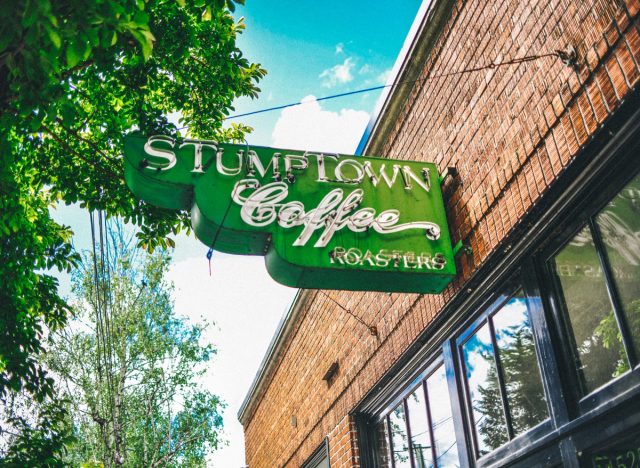

Everything you might want to know about where Stumptown Coffee Roasters gets its coffee and how it makes it is easily accessible on the company’s website. Transparency is key! With over 10 cafés nationwide and with products at over 4,000 grocery stores, Stumptown has always put quality as the #1 goal.
With a bit of a complicated history after having to shutter some stores and being acquired by Peet’s Coffee and Tea in 2015, Stumptown never sacrificed its product quality. “Traveling the world to visit producers reminds us of the differences in every region, every farm, and our approach to sourcing and roasting aims to highlight and honor these distinctions,” says Shauna Alexander, vice president of coffee and sustainability.
In fact, Stumptown coffee teams spend about half a year in origin regions, meeting with producers and learning their practices. “We’re not doing it the easy way by buying bulk, mid-quality beans anonymously from a trading house. Instead, we go right to the source of the best coffee—that farm atop a hill in Ethiopia, for example,” states the company’s website. Every partner and producer that Stumptown works with is clearly outlined there for customers to see.
Roasting for this Portland-headquartered business is about bringing out the unique flavors of the region. “We attempt to highlight what makes that particular variety or farm exciting, rather than imparting our own fingerprint,” the chain says.
Want to know more about coffee shops in the U.S.? Check out The Best Cup of Coffee in Every State.
Source:






